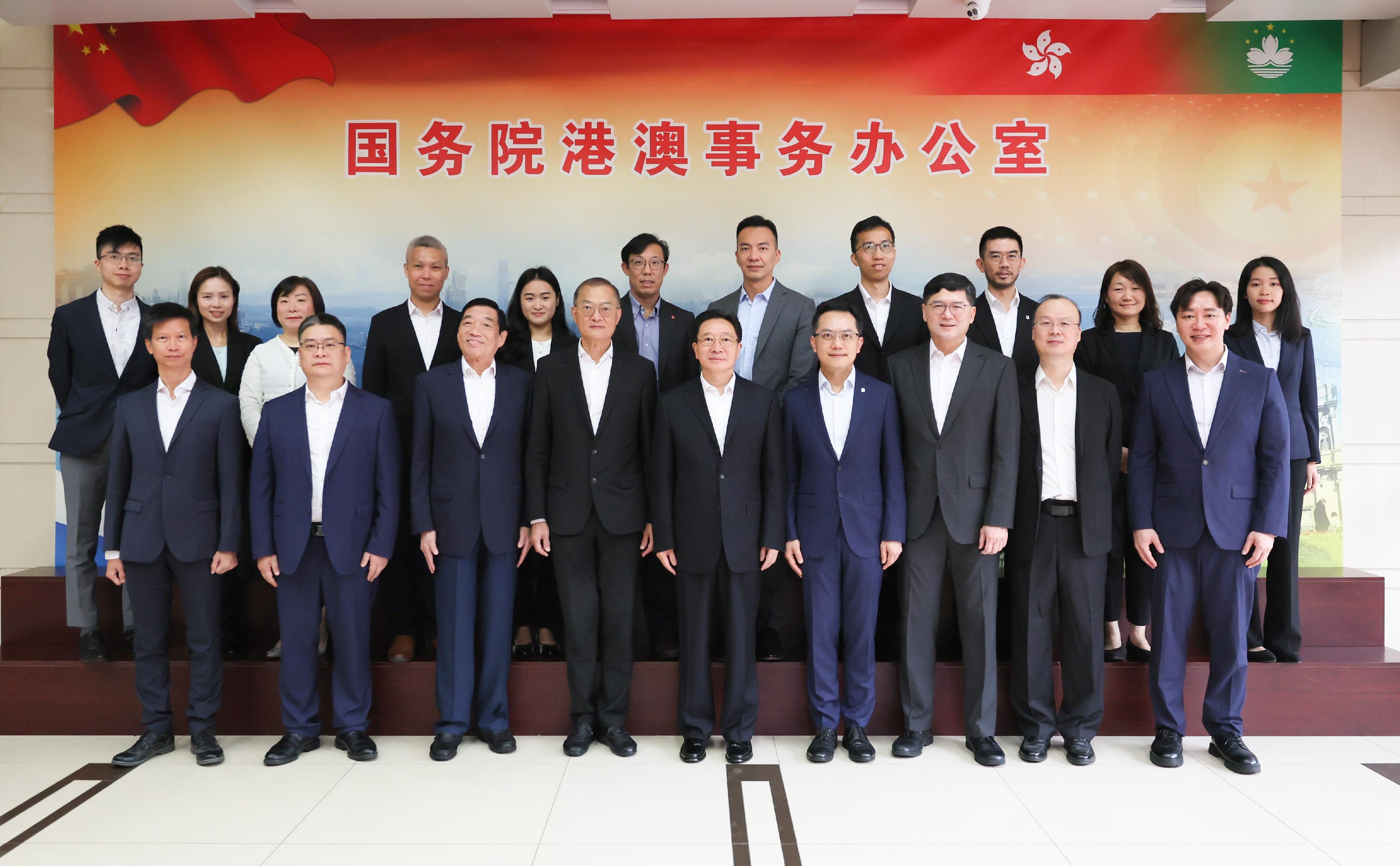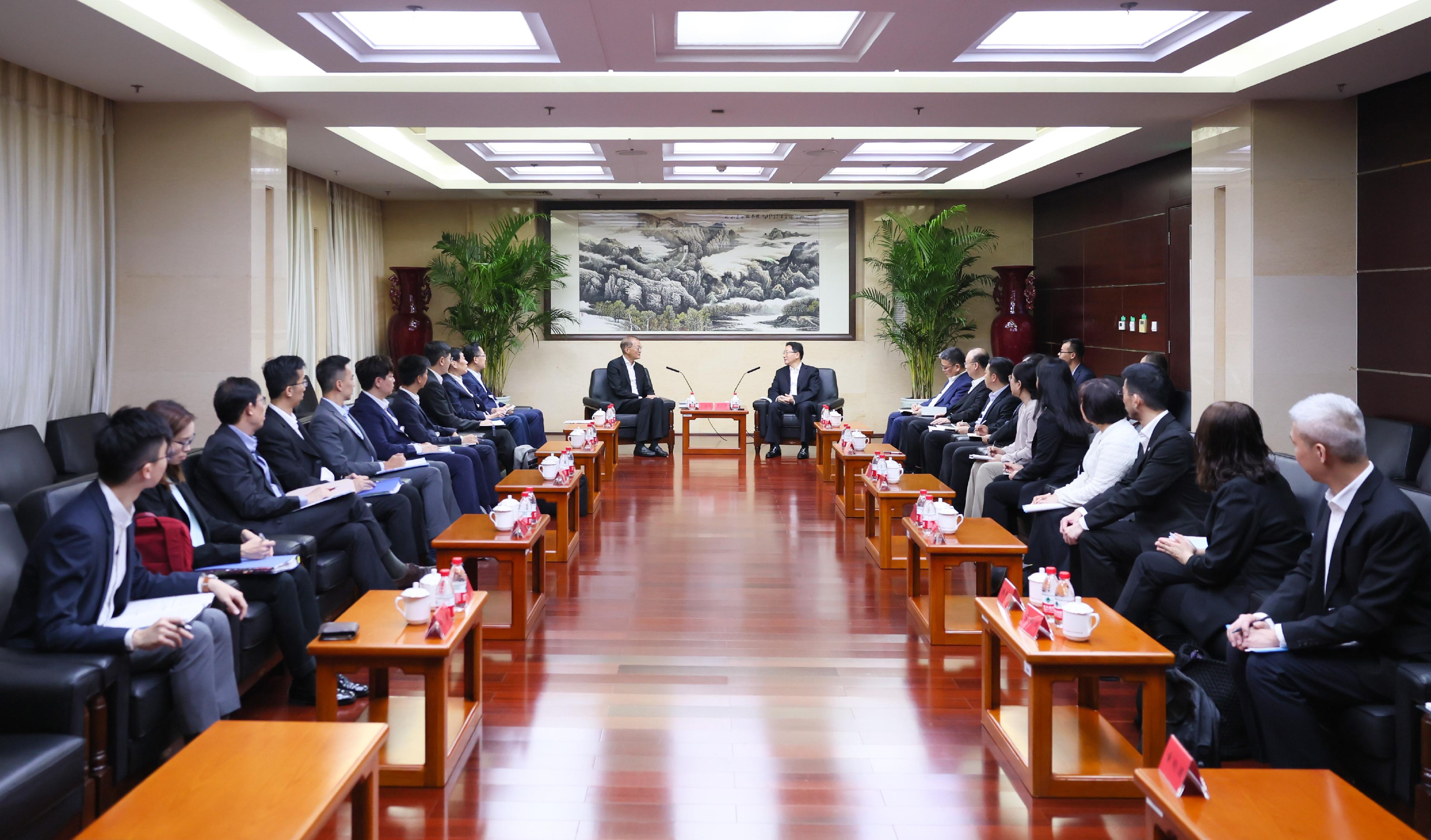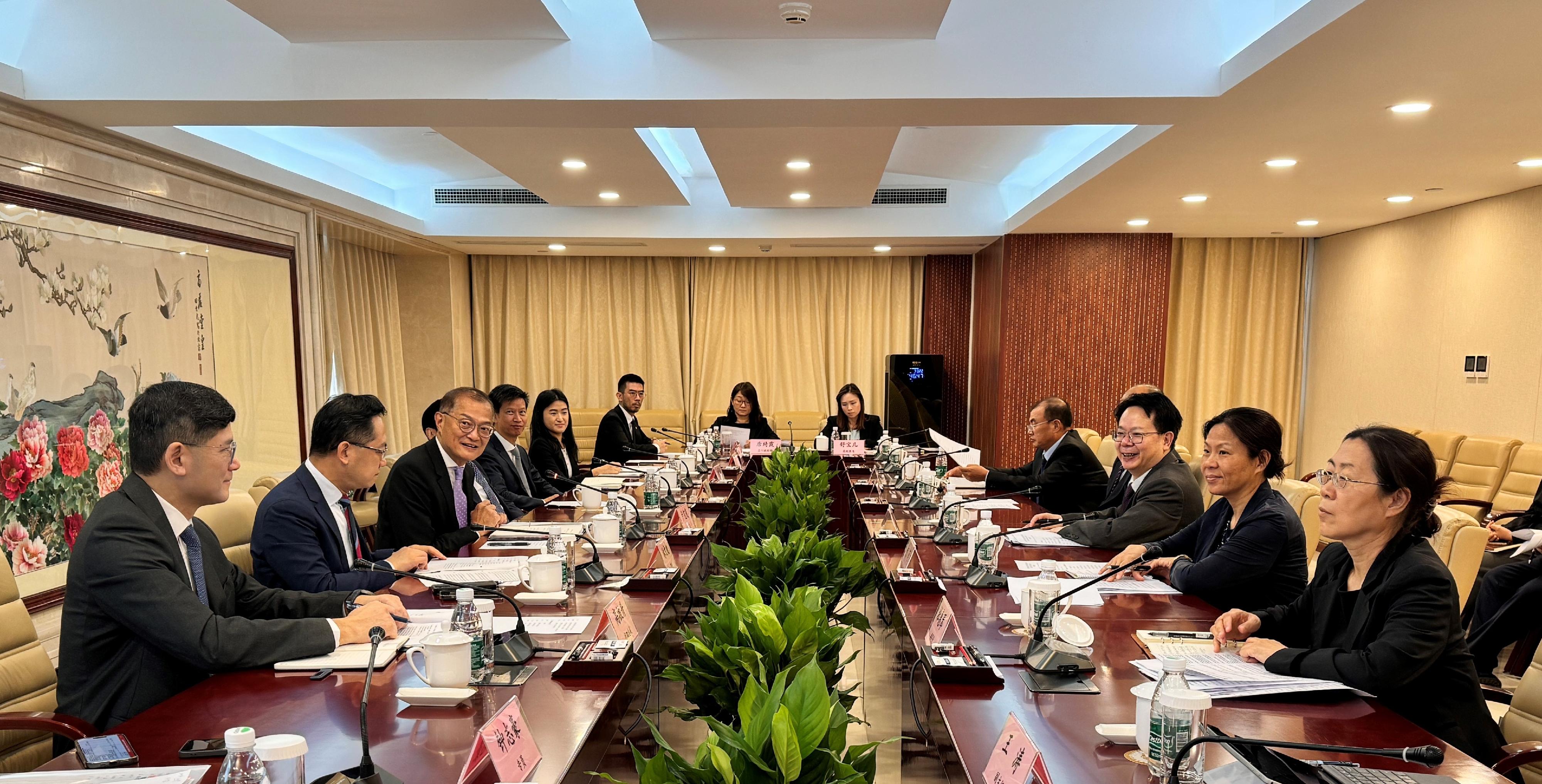Secretary for Health calls on Hong Kong and Macao Affairs Office of State Council and National Medical Products Administration (with photos)
The Secretary for Health, Professor Lo Chung-mau, and his delegation conducted the last day of their visit to Beijing today (September 27), and called on the Hong Kong and Macao Affairs Office of the State Council (HKMAO) and the National Medical Products Administration (NMPA).
The delegation called on the Executive Deputy Director of the HKMAO of the State Council, Mr Zhou Ji, this morning. Professor Lo expressed gratitude to the HKMAO for its continuous support and trust in the work of the Health Bureau (HHB), and introduced to Mr Zhou the latest developments of various healthcare reform initiatives in Hong Kong, including the initial achievements in the area of health and medical innovation.
Professor Lo said, "The Third Plenary Session of the 20th Central Committee of the Communist Party of China (CPC Central Committee) adopted the Resolution of the CPC Central Committee on Further Deepening Reform Comprehensively to Advance Chinese Modernization, and Deepening the Medical and Health System Reform was identified as one of the key tasks. It is essential for Hong Kong to press ahead with reform and innovation in the healthcare system to cater for the mounting service demand of society posed by an ageing population.
"The HHB will stay committed to implementing the spirit of the Third Plenary Session of the 20th CPC Central Committee and reform the healthcare system in a progressive manner. We have been progressively implementing the Primary Healthcare Blueprint and developing new healthcare services and management models to promote primary healthcare development on all fronts. We have enhanced the mechanism of healthcare professional training and created new pathways for admitting non-locally trained healthcare personnel to practise in Hong Kong so as to strengthen the healthcare manpower supply, and made every effort to formulate the Chinese Medicine Development Blueprint in collaboration with the Chinese medicine sector to promote the inheritance and innovation of Chinese medicine, etc. At the same time, we will give full play to the medical strengths of Hong Kong and complement the advantages of other cities in the Guangdong-Hong Kong-Macao Greater Bay Area (GBA) to vigorously develop new quality productive forces in biomedicine according to local conditions, with a view to developing Hong Kong into an international health and medical innovation hub."
"The HHB will adhere to the objectives of 'Government dominating; be bold and committed; improving the healthcare system; caring for all patients; be creative and innovative; leading the GBA; seeking common ground while allowing differences; and winning mutually in the reforms', and make breakthroughs and changes through an innovative mindset, so as to build a 'Healthy Hong Kong' for integration into the nation's 'Healthy China'," he emphasised.
Professor Lo and his delegation then met with Deputy Commissioner of the NMPA Mr Zhao Junning to exchange views on fostering closer collaboration between the Mainland and Hong Kong in key areas such as the regulatory and approval of drugs and medical devices, cross-boundary clinical trials, and real-world data research.
Professor Lo highlighted the efforts to develop Hong Kong into an international health and medical innovation hub, and establish an authority that registers drugs and medical devices under the "primary evaluation" approach in the long run.
He said, "The Hong Kong Special Administrative Region (HKSAR) Government will leverage the city's medical strengths in a more proactive and efficient manner. The Greater Bay Area International Clinical Trial Institute established by the HHB in the Hong Kong Park of the Hetao Shenzhen-Hong Kong Science and Technology Innovation Co-operation Zone and the Greater Bay Area International Clinical Trial Centre in the Shenzhen Park will jointly set up a regional clinical trial collaboration platform leveraging the GBA population base of over 86 million, with a view to attracting more local, Mainland and overseas pharmaceutical and medical device enterprises to conduct research and development (R&D) as well as clinical trials in Hong Kong, and build up the capacity, recognition and status to ensure that the eventual approval mechanism of drugs and medical devices in Hong Kong would be widely recognised internationally and by the Mainland.
The HKSAR Government implemented the new "1+" mechanism for approval of new drugs ("1+" mechanism) on November 1 last year. Since the implementation of the "1+" mechanism, the Department of Health (DH) has received over 250 enquiries from more than 70 pharmaceutical companies, including many overseas and Mainland pharmaceutical companies, and has approved five new drug applications under this mechanism, bringing new hope to patients. The "1+" mechanism has effectively accelerated the R&D and registration and approval of innovative drugs and medical devices in Hong Kong, bringing the benefits of good drugs and R&D to Hong Kong patients. At the same time, the HKSAR Government established the Preparatory Office for the Hong Kong Centre for Medical Products Regulation (CMPR) under the DH on June 5 this year to comprehensively study and plan a regulatory and approval regime for drugs and medical devices suitable for Hong Kong, as well as put forward proposals and steps for the establishment of the CMPR.
Members of the delegation include the Director of Health, Dr Ronald Lam; Deputy Secretary for Health Mr Sam Hui; the Chairman of the Hospital Authority (HA), Mr Henry Fan; and the Chief Executive of the HA, Dr Tony Ko. They will return to Hong Kong tonight.


